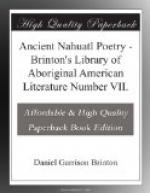The fragments of Boturini’s library collected by M. Aubin, of Paris, contain a number of the original ancient songs of the highest importance, which make us regret the more that this collection has been up to the present inaccessible to students. In his description of these relics published in 1851, M. Aubin refers to the Historical Annals of the Mexican Nation (Sec. VIII, 10, of Boturini’s Catalogue) as containing “historical songs in a dialect so difficult that I have not been able to translate them entirely,” and adds that similar songs are preserved in others of the ancient annals in his hands.[49]
Sec. 9. THE LX SONGS OF THE KING NEZAHUALCOYOTL.
The most distinguished figure among the Nahuatl poets was Nezahualcoyotl, ruler of Tezcuco. His death took place in 1472, at the age of eighty years. His father, Ixtlilxochitl, had been deprived of his possessions and put to death by Tezozomoc, King of the Tepanecas, and until the death of the latter at an advanced age in 1427, Nezahualcoyotl could make but vain efforts to restore the power of his family. Much of the time he was in extreme want, and for this reason, and for his savage persistence in the struggle, he acquired the name “the fasting or hungry wolf”— nezahualcoyotl. Another of his names was Acolmiztli, usually translated “arm of the lion,” from aculli, shoulder, and miztli, lion.
A third was Yoyontzin, which is equivalent to cevetor nobilis, from yoyoma (cevere, i.e., femora movere in re venered); it is to be understood figuratively as indicating the height of the masculine forces.
When his power became assured, he proved himself a liberal and enlightened patron of the arts and industries. The poetry and music of his native land attracted him the more as he felt within himself the moving god, firing his imagination with poetic vision, the Deus in nobis, calescimus, agitant’illo. Not only did he diligently seek out and royally entertain skilled bards, but he himself had the credit of composing sixty chants, and it appears that after the Conquest there were that many written down in Roman characters and attributed to him. We need not inquire too closely whether they were strictly his own composition. Perhaps they were framed on themes which he furnished, or were selected by him from those sung at his court by various bards. The history of the works by royal authors everywhere must not be too minutely scanned if we wish to leave them their reputation for originality.
He was of a philosophic as well as a poetic temperament, and reflected deeply on the problems of life and nature. Following the inherent tendency of the enlightened intellect to seek unity in diversity, the One in the Many, he reached the conclusion to which so many thinkers in all ages and of all races have been driven, that underlying all phenomena is one primal and adequate Cause, the Essence of all Existence. This conclusion he expressed in a philosophic apothegm which was preserved by his disciples, in these words:—




